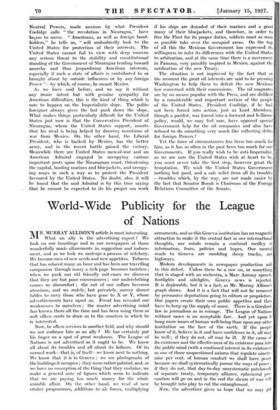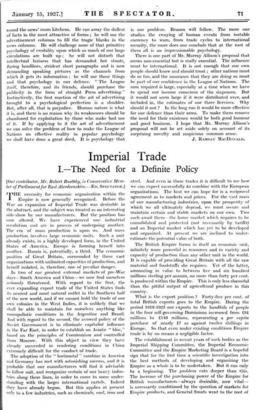World-Wide Publicity for the League of Nations
MR. MURRAY ALLISON'S article is most interesting. What an ally is the advertising expert ! We look on our hoardings and in our newspapers at those wonderfully made allurements in suggestion and induce- ment, and as we look we undergo a process of witchery. We become men of new needs and new appetites. Tobacco that has solaced many an hour and has been our travelling companion through many a rich page becomes tasteless ; when we pack our old friendly suit-cases we discover that they are but poor conveniences ; our underclothing causes us discomfort ; the cut of our collars becomes atrocious, and we rudely, but privately, survey dinner tables to envy those who have gone to X or Y, whose advertisements have upset us. Freud has revealed our weaknesses to ourselves ; the master advertising mind has known them all the time and has been using them as soft silken cords to draw us to the counters in which he is interested.
Now, he offers services in another field, and why should we not embrace him as an ally ? lie has certainly put his finger on a spot of great weakness. The League of Nations is not advertised as it ought to be. We know all about its troubles and all about its failures. Of its normal work—that is, of itself—we know next to nothing. We know that it is in Geneva ; we see photographs of the buildings it occupies ; they seem rather palatial, and, as we have no conception of the thing that they enshrine, we make a general note of figures which seem to indicate that we are paying too much money for the whole amiable affair. On the other hand, we read of new cruiser programmes, additions to air forces, multiplying armaments, and as this Geneva institution has no magnetic attraction to make it the central fact in our international thoughts, our minds remain a confused medley of -information, fears, policies and hopes. Our mental roads to Geneva are rambling sheep tracks, not highways.
Modern developments in newspaper production add to this defect. Unless there be a row on, or something that is staged with an orchestra, a Marc Antony speech, footlights and sidelights, Geneva news is rejected. It is deplorable, bid it is a fact, as Mr. Murray Allison's graph shows. And it is a fact that will not be removed by persuasive deputations going to editors or proprietors. Our papers create their own public appetites and then have to keep up the supply of sauce. There is a Gresham -law in journalism as in coinage. The -League of Nations without sauce is no acceptable fare. And yet upon it hang more issues of human well-being than upon any other institution on the face of the earth. If the people -know of it, believe in it and have confidence in it, all may be well ; if they do not, all may be ill. If the cause of its existence and the effectiveness of its existence pass into the public mind (with a-continued interest in its existence) as one of those unquestioned axioms that regulate ninety- nine per cent. of human conduct we shall have peace because we shall systeinatically pursue the ways of peace ; if they do not, that day-to-day unsystematic patchwork of separate treaty, temporary alliance, ephemeral pre- caution will go on and in. the end the shears of war will be brought into play to cut the entanglement.
' Now, the advertiser gives us hope that we may get round the news' room kitchens. He can array the dullest of facts in the most attractive of forms ; he will use. the advertisement columns to fill the tragic blanks in the news columns.. He will challenge none of that primitive psychology of credulity upon which so much of our large circulations are built up ; he will not disturb that intellectual laziness that has demanded hot stunts, flaring headlines, strident short paragraphs and is now demanding . speaking pictures as the channels from which it gets its information ; he will use those things and that psychology in our defence. " The League itself, therefore, and its friends, should purchase the publicity in the form of straight Press advertising." Instinctively, the first reaction of the art of advertising brought to a psychological perfection is a shudder. But, after all, that is prejudice. Human nature is what it is, and there is no reason why its weaknesses should be abandoned for exploitation by those who make bad use of it. If by applying to it the art of advertisement we can solve the problem of how to make the League of Nations an effective reality in popular psychology we shall have done a great deed. It is psychology that is our problem. Reason will follow. The more one studies the swaying of human events from instable currency to wars, from trade cycles to international security, the more does one conclude that at the root of them all is an impressionable psychology.
There is one part of Mr. Murray Allison's proposal that seems non-essential but is really essential. The influence must be international. It is not enough that our own people should know and should trust ; other nations must do so too, and the assurance that they are doing so must be part of our confidence in the League of Nations. The sum required is large, especially at a time when we have to spend our income conscious of the sixpences. But it would not seem large if it were distributed over, and included in, the estimates of our three. Services. Why should it not ? In the long run it would be more effective for our defence than their arms. To make them remove the need for their existence would be both good humour and good business. I hope that Mr. Murray Allison's proposal will not be set aside solely on account of its surprising novelty and suspicious common sense.
J. RAMSAY MACDONALD.



































 Previous page
Previous page